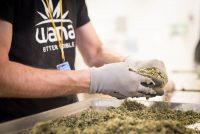This November 8th, voters in five states will head to the polls to decide on legalizing recreational cannabis and another three states have ballot initiatives that would legalize medical cannabis. If any of those five states pass a measure for recreational legalization, including Massachusetts, Maine, Nevada, Arizona and California, (which are all leading in the polls) they could potentially create massive new market opportunities for cannabis brands that have their eye on expansion.
Nancy Whiteman, co-owner of Wana Brands and chair of the Cannabis Business Alliance Infused Product Committee, sees great potential in capitalizing on those markets early. Whiteman has been working with Wana Brands since 2010 in Colorado, starting out in the young medical market there.

After expanding to the recreational market, Wana Brands saw its sales skyrocket. From January to August 2016, Wana had the best-selling candy brand in Colorado with 21% dollar share, according to BDS Analytics. Wana Brands has already expanded to Oregon and will launch in Nevada on November 15th, with agreements signed to expand in other states as well. “The model we are pursuing is a licensing agreement where we partner with existing or new license holders in their state,” says Whiteman. “In many ways they are doing the heavy lifting, but we are providing an enormous lift by licensing our intellectual property to them.” That model for growth is becoming increasingly common in some of the more established brands, like Steep Hill Laboratories, GFarma Labs, Dixie and others. Whiteman says that Wana Brands also has a partner in Illinois, Massachusetts and a number of other states they hope to reach.

According to Mark Slaugh, executive director of the Cannabis Business Alliance and chief executive officer of iComply, a compliance services provider, brands from Colorado expanding to other states need to ask themselves if their reputation is on the line with these new operators. “If you are licensing to companies that are not compliant, the penalties could be huge and they vary state to state- that could potentially hurt the overall brand image nationally,” says Slaugh. “People doing the licensing that are operating with full compliance really need to look at controlling that risk and mitigating that as much as possible.” With brand trust on the line, there are substantial risks that come with expansion. “We help clients ensure quality is consistent so, for example, an edible product would taste the same in Colorado as it would in Nevada or Arizona. They need to follow the intellectual property consistently but more importantly follow those specific regulations in that state to stay afloat.” Managing ongoing compliance in different states requires monitoring regulatory updates across multiple markets, which can get incredibly complex.

“Six years ago, it was much easier to get into the market in Colorado,” says Whiteman. “There were no capital requirements, no limits on the number of licenses, but there was still a lengthy application and vetting process- as long as you met those minimum requirements you could get a license.” Other new states put stringent limits on the number of licenses granted and some have extraordinarily cost-prohibitive capital requirements, up to a million dollars, as is the case for New York. “Anyone who becomes a license holder in Massachusetts has to be prepared to embark on three separate business models, which is a massive undertaking,” says Whiteman. Massachusetts requires license holders to cultivate, process and dispense in a vertically integrated model.
In other states, Wana Brands is working with exclusive partners who will have the capabilities to manufacture and distribute throughout the entire state, but in Massachusetts that won’t be the case. “To cover the state, we need several partnerships; the partner we are working with is a little south of Boston,” says Whiteman. But all that could change if voters in Massachusetts legalize it recreationally, opening a much larger market than the current medical program. “With no legislation drafted yet, the regulatory environment is still up in the air in Massachusetts so there is no way of telling what the recreational market will look like.” In terms of ongoing regulatory compliance, Whiteman believes that Colorado still has some of the most stringent rules. The universal symbol printed on every individual edible product serving is one example. “Every state has different lab testing and licensing requirements, but Colorado looks like the most stringent currently,” says Whiteman. “Colorado requires a full gamut of lab testing including homogeneity, potency, residual solvents, contaminants and soon pesticides too.” According to Mark Slaugh, Nevada’s lab testing regulations are fundamentally different from Colorado’s with regard to sampling procedures, but the broader inconsistencies in lab standards need to be addressed. “The lack of laboratory standardization state to state with regard to methods creates a big challenge to get consistent, proficient lab testing across the board,” says Slaugh.

A big differentiator between Colorado and other states is that it was a first mover. “When Colorado came online there were not any established brands to speak of anywhere in the country- we were all pioneers,” says Whiteman. “Because it is so difficult to get a license in another state, either the organization or investor groups are looking to partner with established brands.” The advantages to this business model are many. Expediting your entry to market gets you the advantage of being a first mover. Working with an established brand also minimizes risks and the learning curve. “Bigger players understand that building a brand from scratch is time consuming and expensive so I think we will see a lot of these partnerships.”
As those new states come online, similarities in their regulations might appear in the form of standard operating procedures (SOPs) or good manufacturing practices (GMPs). “We might start to see a standardization from state to state that models FDA GMPs or USDA GAPs, [good agricultural practices] moving toward a framework that is more consistent with the possibility of federal regulation,” says Slaugh. Another commonality among a number of states is the implementation of a statewide tracking system. According to Slaugh, California has no such mandated system in place yet. “They will probably have one eventually but the market is so localized there- we will see if California will be ready with a statewide compliance system for tracking by 2018,” says Slaugh. “With such a weird patchwork of local governments allowing or not allowing certain operations to exist, it is a tough business to be in and it’s getting tougher every day.”












